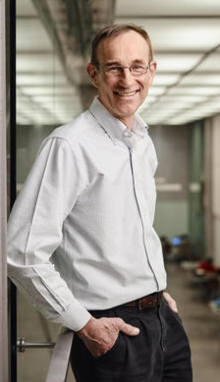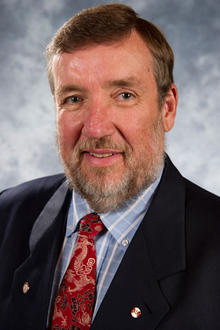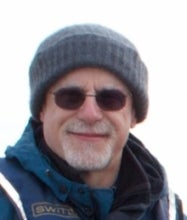The Daily Bulletin is published by Internal and Leadership Communications, part of University Communications
Contact us at bulletin@uwaterloo.ca
Submission guidelines
Editor:
Brandon Sweet
University Communications
bulletin@uwaterloo.ca
Three people with strong links to the University of Waterloo were among the newest appointees to the Order of Canada.
Her Excellency the Right Honourable Julie Payette, Governor General of Canada, announced the 125 appointees on December 29.
 Raymond Laflamme, founding executive director of the Institute for Quantum Computing, was named an Officer of the Order of Canada. Laflamme received the honour "for his outstanding achievements as an administrator and researcher who has advanced quantum science and technology in Canada."
Raymond Laflamme, founding executive director of the Institute for Quantum Computing, was named an Officer of the Order of Canada. Laflamme received the honour "for his outstanding achievements as an administrator and researcher who has advanced quantum science and technology in Canada."
Laflamme led the Insitute for Quantum Computing (IQC) at Waterloo from its inception from 2002 to 2017. Under his leadership, IQC grew into a world-class community of more than 200 researchers and became a global player in the quantum race.
“I am honoured to receive this recognition,” said Laflamme, who holds the Mike & Ophelia Lazaridis John Von Neumann Chair at the Institute for Quantum Computing. “Quantum computing has the power to transform the way we approach everything from the way we conceive the world to medicine to geographical exploration, and more. Like the information revolution shaped the 20th century, the quantum revolution will define the 21st. We are really just at beginning of seeing the major impacts quantum will have on our lives.”
The Institute for Quantum Computing has posted a story recognizing Laflamme's achievement with more details.
 Keith Hipel of Systems Design Engineering was named an Officer of the Order of Canada. Hipel was cited "for his extensive contributions to the field of environmental engineering and for his leadership within multiple academic and professional institutions."
Keith Hipel of Systems Design Engineering was named an Officer of the Order of Canada. Hipel was cited "for his extensive contributions to the field of environmental engineering and for his leadership within multiple academic and professional institutions."
During a career spanning decades, much of it dedicated to solving challenging problems related to conflict resolution in engineering, Hipel has taught thousands of students and supervised dozens of candidates for graduate degrees.
He has a global reputation for pioneering contributions to environmental systems engineering and holds the title of University Professor, the highest academic honour at Waterloo.
The Faculty of Engineering has more on the story of Hipel's induction.
 Douglas Stenton, an adjunct professor of anthropology who serves as heritage director in Nunavut, was named a Member of the Order of Canada. Stenton was cited "for his enduring contributions to the preservation of Canada’s northern heritage."
Douglas Stenton, an adjunct professor of anthropology who serves as heritage director in Nunavut, was named a Member of the Order of Canada. Stenton was cited "for his enduring contributions to the preservation of Canada’s northern heritage."
"Over his career Dr. Douglas Stenton has been a scholar, educator and civil servant, devoting his exceptional energies to the archaeological heritage of what is today Nunavut," writes Professor Robert Park of Waterloo's anthropology department. "He introduced several generations of young Inuit to archaeology through field schools and through employing them on salvage excavations, providing those young people with unique opportunities to learn about their own heritage and about their ancestors’ lives. And since 2007 Doug planned and personally led the Government of Nunavut's participation in the investigation of Sir John Franklin's catastrophic 1845 Northwest Passage expedition. A major part of his contribution was ensuring that land-based investigations formed part of the search, and it was a 2014 find from that land-based research that led to the discovery of Sir John Franklin's ship Erebus."
Created in 1967, the Order of Canada is one of Canada's highest civilian honours, and recognizes outstanding achievement, dedication to the community and service to the nation. Close to 7 000 people from all sectors of society have been invested into the Order. Appointments are made by the governor general on the recommendation of the Advisory Council for the Order of Canada.
The date of the investment ceremony has not yet been set.
This article was originally published on Waterloo News.
New research from the University of Waterloo finds that lower class populations are wiser than their middle-class counterparts in their ability to reason about interpersonal matters.
The study measures wisdom as the ability to be open-minded, intellectually humble and integrate different perspectives on the issue people reflect on. In comparing social classes and their associated wisdom, the study reveals that more affluent regions and individuals, as well as situations reflecting higher social standing are linked with diminished ability to reason wisely.
“This is not surprising when we consider our cultural emphasis on intelligence such as IQ, competency to accomplish tasks independently and the focus on self as opposed to the considerations of others, in the reach for success,” said Igor Grossmann, associate professor of psychology who led the Waterloo research. “As we continue to focus as a society on independence and entitlement among the middle class, we are also inadvertently eroding wisdom and reasoning in favour of a more self-centered population.”
Using large-scale surveys and lab studies, Grossmann and co-author Justin Brienza, who was PhD candidate at Waterloo at the time of the research, were able to build on previous studies that determined that individuals with a lower income are often more sensitive to their environments.
Driven by economic scarcity, these individuals will consider the impact of their decisions on those around them and those with whom they have interdependent relationships. Characteristics of open-mindedness and integrating different perspectives are necessary in order to coordinate with others and share resources.
The present study of social class differences in wise reasoning is specific to interpersonal conflicts and does not suggest class-related differences in the domain of intergroup reasoning, such as within social or political debates.
“Seeing self in the context of interpersonal relationships can be prosperous, as evident in other societies such as China, Korea or Japan” said Grossmann. “To increase cultural prosperity Canadian law and policy makers have the opportunity integrate the wisdom and learning from resilience with which people approach economic adversity.”
Grossmann and Brienza's study appears in the journal Proceedings of the Royal Society B.
Information Systems & Technology (IST) is reporting that myWaterloo is no longer available due to an expired Nexus security certificate, which ran on Wednesday, December 27 and will not be renewed.
Mailservices accounts can no longer be accessed via myWaterloo. However, users can securely access their mailservices account via SquirrelMail.
Graduate students still using mailservices can be migrated to a connect account, which IST can create for them. To submit a request to have a connect account created email request@uwaterloo.ca. To find out more, check IST's faculty and staff email page.
Anyone with questions or concerns should contact the IST Service Desk via email at helpdesk@uwaterloo.ca or by calling extension 44357.
Winter 2018 Orientation, Tuesday, January 2, to Friday, January 5.
Engineering Seminar: Algebra and Computation for Understanding Discrete Dynamical Systems, Prof. Chrystopher L. Nehaniv, University of Hertfordshire, Thursday, January 4, 2:30 to 4:00 p.m., DC 1304.
World Music: Balinese Gamelan Ensemble rehearsal, Thursday, January 4, 4:00 p.m. to 5:00 p.m., Grebel Room 1209 (new members).
Chamber Choir audition, Thursday, January 4, 2:30 p.m. to 5:00 p.m., Conrad Grebel Chapel.
Knowledge Integration Seminar: Summer off? No — summer on! Friday, January 5, 2:30 p.m., EV3 1408.
Winter Welcome Week, Monday, January 8 to Friday, January 12.
Chamber Choir audition, Monday, January 8, 10:00 a.m. to noon, Conrad Grebel Chapel.
CTE550 LEARN for TAs, Monday, January 8, 9:30 to 11:00 a.m.
Instrumental Chamber Ensemble audition, Monday, January 8, 9:30 a.m. to noon, Grebel Room 1209.
Chapel Choir auditions, Monday, January 8, 2:30 p.m. to 3:30 p.m., Grebel Room 1204.
Winter 2018 Jazz Ensemble Auditions, Monday, January 8, 6:00 p.m. to 9:00 p.m., Conrad Grebel Great Hall.
University Choir auditions, Tuesday, January 9, 6:00 p.m. to 7:30 p.m., Conrad Grebel chapel.
Instrumental Chamber Ensemble audition, Wednesday, January 10, 9:30 a.m. to noon, Grebel Room 1209.
Campus Life Fair, Wednesday, January 10, 11:00 a.m. to 2:00 p.m., Student Life Centre Great Hall.
CTE759 Designing Teaching and Learning Research, Wednesday, January 10, 12:00 to 1:30 p.m., FLEX Lab, Dana Porter Library.
Master of Business, Entrepreneurship and Technology Information Session webinar, Wednesday, January 10, 5:00 p.m., 5:30 p.m.
Clubs and Societies Days, Thursday, January 11 and Friday, January 12, Student Life Centre Great Hall.
Getting it done: Productive writing strategies for big projects, Thursday, January 11, 10:00 a.m.
Improve your lab report writing, Thursday, January 11, 12:30 p.m.
WaterTalk: “Exploration of the Earth’s Deep Hydrogeosphere and Subsurface Microbial Life,” presented by University Professor Barbara Sherwood Lollar, Thursday, January 11, 2:30 to 3:30 p.m., DC 1302. Please register as seating is limited.
orchestra@uwaterloo audition, Thursday, January 11, 8:30 p.m. to 9:30 p.m., Ron Eydt Village.
Writing and Communication Centre webinar, "Improve your lab report writing," Thursday, January 11, 12:30 p.m.
Knowledge Integration Seminar: Sustainability & Business Decisions in the Built Environment, Friday, January 12, 2:30 p.m., EV3 1408.
Biology Seminar: Redox proteomics and cell biology, Friday, January 12, 3:30 p.m., EIT 3142.
Clarity in scientific writing, Wednesday, January 17, 10:00 a.m.
GMOs: Facts and Misconceptions, documentary with director in attendance, followed by panel discussion? Wednesday, January 17, 7:00 p.m., Humanities Theatre.
Beyond Essays: Approaching Peace Education Differently opening reception, Thursday, January 18, 2018, 4:00 p.m., Conrad Grebel Gallery. Please note the corrected date.
Research Matters: Getting Published, Friday, January 19, 9:30 a.m. to 4:00 p.m., Balsillie School of International Affairs.
Knowledge Integration Seminar, "The Web as Infinite Archive: Why we Turned to Machine Learning, Distributed Computing, and Interdisciplinary Collaboration to understand the Recent Past," Friday, January 19, 2:30 p.m., EV3 1408.
Biology Seminar: Bacterial Phages shaping the gut microbiome, Friday, January 19, 3:30 p.m., EIT 3142.
Grammar studio series: Workshop 1, Monday, January 22, 10:00 a.m.
NEW - HeForShe Ideathon, Tuesday, January 23, STC 2002.
Grammar studio series: Workshop 2, Wednesday, January 24, 10:00 a.m.
Chemistry Seminar: Pushpull Alternating and Hypercoordinate Asymmetrical Architectures for Light and Moisture Stable Polystannanes, Wednesday, January 24, C2-361.
Getting organized: tools for resisting racism and white supremacy, Thursday, January 25 to Saturday, January 28.
The Daily Bulletin is published by Internal and Leadership Communications, part of University Communications
Contact us at bulletin@uwaterloo.ca
Submission guidelines
The University of Waterloo acknowledges that much of our work takes place on the traditional territory of the Neutral, Anishinaabeg, and Haudenosaunee peoples. Our main campus is situated on the Haldimand Tract, the land granted to the Six Nations that includes six miles on each side of the Grand River. Our active work toward reconciliation takes place across our campuses through research, learning, teaching, and community building, and is co-ordinated within the Office of Indigenous Relations.